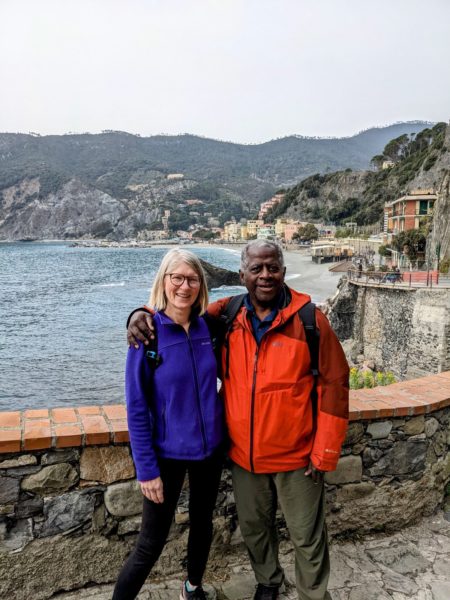The Last Part of the Journey
by Anna Fuglestad, MD, United Family Medicine
I held his hand with tears slowly and continuously flowing down my cheeks. “Why now? Please not yet…” I pleaded. My heart was heavy. Yet I was comforted when I looked around the small room in this memory care unit. The question I had just asked was answered. My grandfather was dying. There was no stopping this part of the journey. As I continued to look around, I thought: “Who could want more?” I felt peace as I saw my grandfather surrounded by family all telling stories of his legacy with laughter and tears. He held my hand, his breathing shallow but unlabored, just as he had done when I was growing up. I knew that this honored my grandfather’s wishes.
The environment during his passing was not just happenstance. Peace and dignity such as this at the end of life started with a conversation long before that day. For my grandfather, this conversation started eight years before when he was diagnosed with Alzheimer’s disease. This news came shortly after his wife died from complications of the same slowly progressive disease. He had lived his life as a husband, father, and pastor. He wanted those stories of his life to be his legacy no matter what the future held for him with this diagnosis. My father took up the task of how to make my grandfather’s wishes a reality. He helped my grandfather fill out an advanced directive: a document that allowed my grandfather to speak clearly about his wishes for care in the years to come.
When it comes to end of life planning, terms such as DNR, DNI, Advanced Care Directive, and POLST seem to be thrown around in the healthcare system, news, and media. What do they all mean? Are they not all the same thing? Why is it important? What do I mean if I say “do everything you can to keep me alive?” What does a healthcare provider hear if I say this?
TERMS & DEFINITIONS (reference: American Academy of Family Physicians)
Do everything you can to keep me alive:
Everything: Chest compressions, breathing tubes and machines, surgeries, medications to keep your blood pressure and heart rate stable, antibiotics if necessary, prolonged hospital stays.
Alive: heart beating fast enough and strong enough to get oxygen to the brain.
Do Not Resuscitate (DNR): Do not perform chest compressions or electric shocks to try and restart my heart if it cannot beat on its own.
Do Not Intubate (DNI): Do not put a breathing tube down my throat if I have difficulty breathing without help or am unable to keep my airway open.
Advanced Directive: “State specific…documents and other patient centered, end of life care resources.” This document needs to be notarized. Valuable for anyone to designate preferences but particularly who should speak for them medically if they are unable to speak for themselves. This can be helpful in unexpected medical crises. You can update these documents as situations change, and should be available to family and the medical team caring for you.
POLST: (Physician’s Orders for Life-Sustaining Treatment): “This form accompanies the patient to different care settings and stipulates appropriate medical interventions.” Intended for use when you have more advanced illness.
Values History: “Useful [document] for clarifying the person’s values, may be attached to the advanced directive.” This can be a statement of what your beliefs are in relationship to the end of your life, and what you most value. This serves to educate those who care for you about what is most important to you.
If any recommendation can be made, it would be to talk now with your loved ones — give them the gift of knowing what you desire if something expected or unexpected should happen. The conversation may feel uncomfortable and unnecessary when all is well and you are in good health. However, none of us know what each day will bring. We all know of people young and old who are suddenly in an accident or other health crisis. At a minimum, designating who you trust to represent your wishes in this situation can be invaluable. Talking before the hurricane of emotions and questions that happens in crisis can allow more detailed conversations and be a way to be sure that your values are clear, and understood by those dear to you. They may be comforted and relieved to know that their difficult decisions are guided by your wishes.
If you have questions or would like to learn more, the West End Community will be holding an event on August 15 from 5:30-7:30 p.m. at the West 7th Community Center in order to provide an opportunity to continue this conversation as well as provide you with resources for next steps. A documentary, Being Mortal, will be shown as well as having a panel of professionals in the field to answer questions. Light snacks and beverages will be provided. This is an event for all adults of any age. Bring family members and loved ones as we dive into an essential discussion.
Dr Anna Fuglestad is a member of the UFM Residency Program.”


